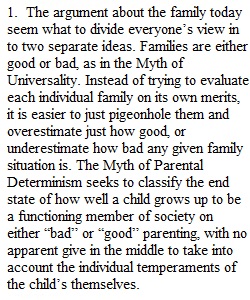


Q Week 9: Assignment #4 • Points 6.5 • Submitting a file upload • File Types doc, docx, pdf, and rtf Assignment #4- Read the articles under the section titled marriage and family by Skolnick, Coontz, and Keister. Answer the questions posted in the assignment file and upload your work through the assignments link to the left of the screen. Assignment #4- Online Course Family in Transition- Skolnick and Skolnick 1. The authors state that arguments about the family today are polarized and discussed as either-or choices between two extreme positions. Further, “This kind of argument makes it difficult to discuss the issues and problems facing the family in a realistic way.” Why is this so? Hint- briefly include the family myths. 2. What three revolutions have changed the family and why? Support. Divorce in Perspective- Coontz 1. According to Stephanie Coontz, is the high divorce rate “good” or “bad”? How does she answer this question? Support. 2. What does William Goode mean when he suggests that we “institutionalize” divorce? What good will this do, according to Goode? Do you agree? Support. Family Life and Economic Success- Keister 1. What factors in the family discussed by Keister influence the success and wealth of children? Support. 2. How in particular does family size impact education according to the author? Support.
View Related Questions